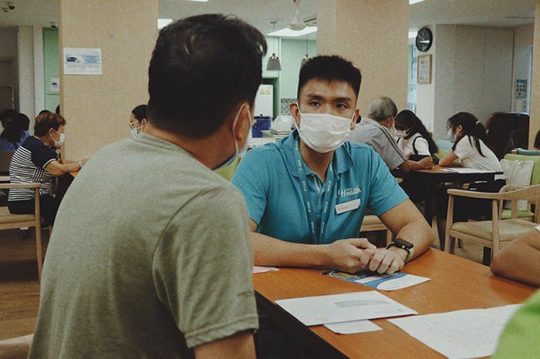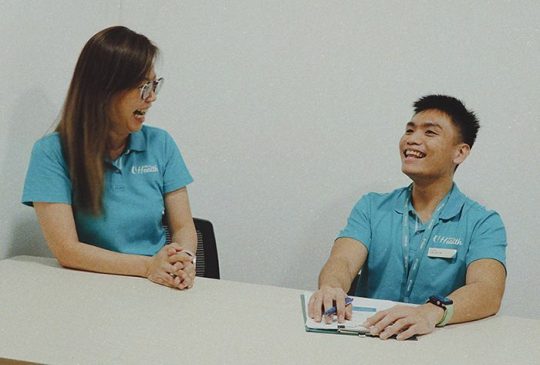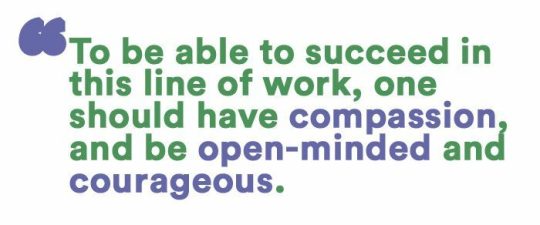
I have always been interested in mental wellness, probably because my parents are great advocates of it — my mum is a professional counsellor who works with prisoners. Her work changes the lives of prisoners. Similarly, I wanted to make an impact on others by taking care of people’s mental health, which is why I got into the care sector. In fact, I see myself being in this sector as a psychologist in the future! But for now, I am still in my first job, and there is much to learn.
I have been a care associate with the NTUC Health Community Resources Engagement and Support Team (CREST) for the past five months, having joined them after I graduated with a Diploma in Social Services. My current role allows me to help people, not just with their mental health, but also with their social systems and physical health.
The work is interesting because each day presents new experiences. There are days when I would join my colleagues to visit families and vulnerable seniors in the community. Other days are spent doing mental health screenings at events, coordinating with community partners and hospitals, on top of administrative work.

Before working here, I did not know that the CREST team not only serves clients that are already diagnosed with mental illness, but also suspected cases and even caregivers. Caregivers are the closest contact that clients have, hence their presence is essential when we conduct any assessment.
Making a positive impact on people's lives
The main joy I found through this job is the satisfaction that I have made a positive impact on people’s lives. Some of these vulnerable seniors may not have next of kin, and they stay alone and isolated in their flats. The thought that I am helping them in their ageing journey gives me great joy that I, too, have a purposeful job in society.

To be honest, before I got a job in this sector, I only had a vague idea of what Community Care is. My impression was that it was quite scary in the sense that I would have to go out into the community and engage with people. Sometimes these people may not want to talk to us as they think we may not be able to help them. For situations like these, I would be try to have a positive perspective when I engage with them.
Working at CREST has been an eye-opener for me. On my first day, I felt lost, nervous and excited because I didn’t know the challenges that I may face. Today, I am slowly learning on-the-job. The organisation has been very supportive in my development. I was slowly exposed to challenges, and I know I could approach my colleagues for help when I need it.
I also look to my colleagues for inspiration. During my five months here, I have seen colleagues who go above and beyond the call of duty in times of emergencies. For example, if vulnerable seniors who live alone are not feeling well, my colleagues would rush down to attend to them, bring them to the nearest clinic or hospital, and accompany them even outside working hours.

That’s a commitment and dedication I aspire to have, though sometimes, the challenges of this job make it difficult. For example, there may be vulnerable seniors who may require assistance, but do not wish to be contacted. I also have to learn how to engage seniors who may not be as willing to hear us out. But what keeps me going is the exposure and opportunity to learn from these experiences, and this helps me find meaning in the work I do.
If I were to choose an aspect of the job I’d love to do more of, it would be to have more engagements, do community events, get to know the community more — and through that, learn more about myself. I enjoy engaging with seniors, and I get a sense of fulfilment when I’m able to help and teach seniors to stay connected with the changing times.
A chance to make a difference
By helping seniors, I also learn a lot from them as my colleagues and I get to hear interesting and inspiring stories about how they got through hardship. As a care associate, I make regular rounds of professional assessment before drafting up a care plan on how to help seniors. There was one senior who shared that she has depression. She shared with us that she would keep herself active by doing housework, shopping for groceries, cooking, etc - activities that she understands would help with mental wellness. She would also keep herself updated by reading the news online. And she would follow up with her medical appointments. I was inspired by her resilience and hope to encourage others to keep push on for good health and happiness.

With these traits, one can then develop empathy for others, be willing to help others and handle challenging social situations.
I have always believed that we should treat others how we would like to be treated and this will, hopefully, cause a positive chain reaction in the community. I hope that we can one day live in a world where everyone treats each other with respect and kindness.
This article was first featured on mosAIC on 10 November 2022.
Join Us
Interested in a fulfilling career in the health and eldercare industry? Find out more at our careers page!

